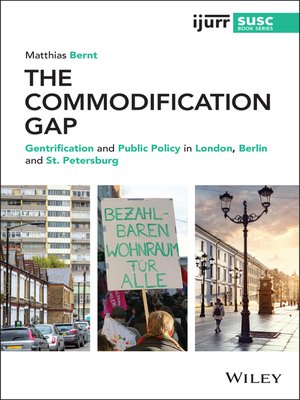The Commodification Gap
ebook ∣ Gentrification and Public Policy in London, Berlin and St. Petersburg · IJURR Studies in Urban and Social Change
By Matthias Bernt

Sign up to save your library
With an OverDrive account, you can save your favorite libraries for at-a-glance information about availability. Find out more about OverDrive accounts.
Find this title in Libby, the library reading app by OverDrive.



Search for a digital library with this title
Title found at these libraries:
| Library Name | Distance |
|---|---|
| Loading... |
'In an elegant and careful theoretical analysis, this book demonstrates how gentrification is always entwined with institutions and distinctive contextual processes. Matthias Bernt develops a new concept, the "commodification gap", which is tested in three richly researched cases. With this, the concept of gentrification becomes a multiplicity and the possibility of conversations across different urban contexts is expanded. A richly rewarding read!'
—Jennifer Robinson, Professor of Human Geography, University College London, UK
'Urban studies has reached a stalemate of universalism versus particularism. Matthias Bernt is breaking out of this deadlock by being very precise about what exactly is universal and what is not – and how one can conceptualize both. The Commodity Gap is a key contribution to not only gentrification studies, but also to comparative urbanism and urban studies at large.'
—Manuel B. Aalbers, Division of Geography & Tourism, KU Leuven, Belgium
The Commodification Gap provides an insightful institutionalist perspective on the field of gentrification studies. The book explores the relationship between the operation of gentrification and the institutions underpinning - but also influencing and restricting - it in three neighborhoods in London, Berlin and St. Petersburg. Matthias Bernt demonstrates how different institutional arrangements have resulted in the facilitation, deceleration or alteration of gentrification across time and place.
The book is based on empirical studies conducted in Great Britain, Germany and Russia and contains one of the first-ever English language discussions of gentrification in Germany and Russia. It begins with an examination of the limits of the widely established "rent-gap" theory and proposes the novel concept of the "commodification gap." It then moves on to explore how different institutional contexts in the UK, Germany and Russia have framed the conditions for these gaps to enable gentrification. The Commodification Gap is an indispensable resource for researchers and academics studying human geography, housing studies, urban sociology and spatial planning.







